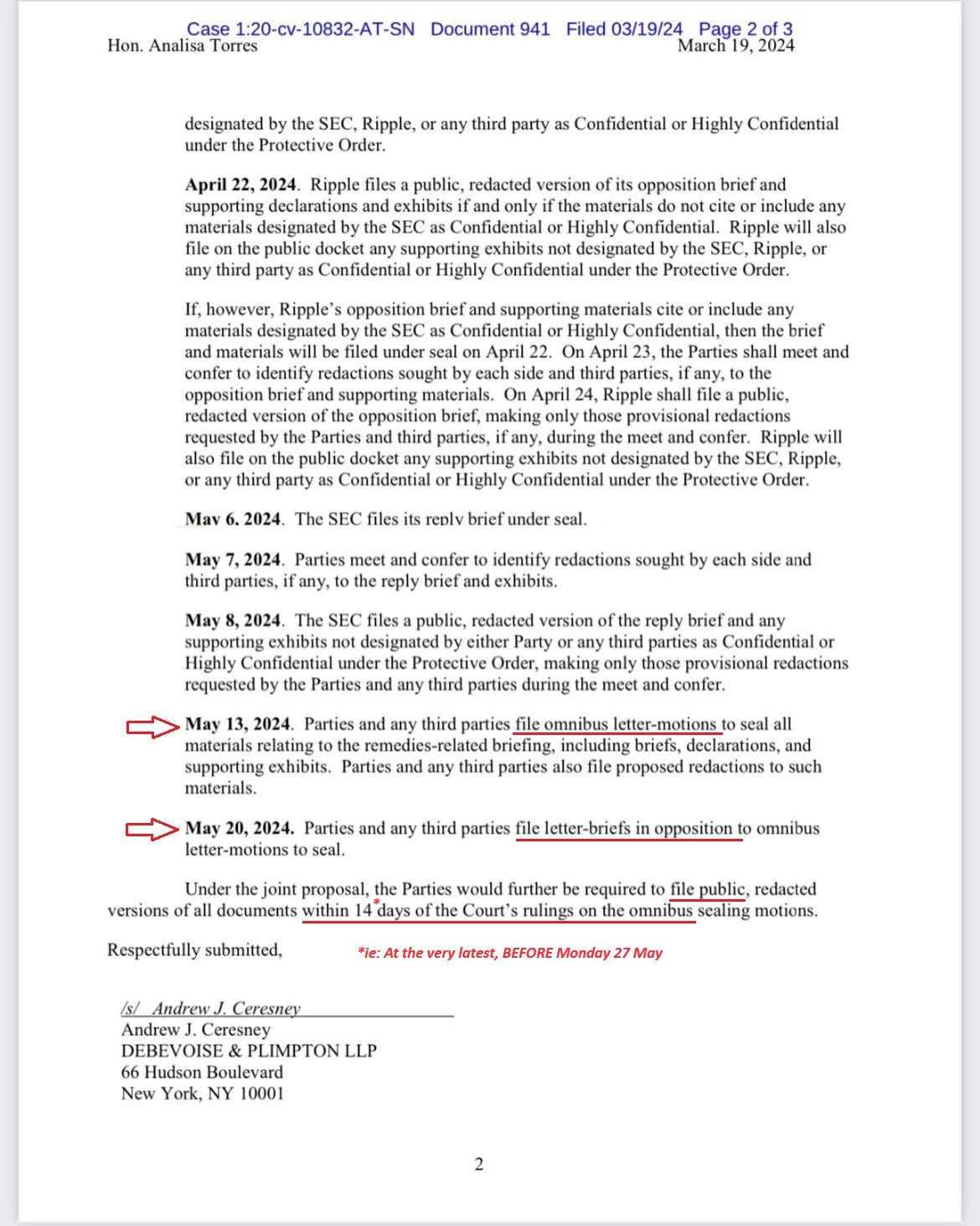SEC vs. Ripple lawsuit update: All related parties to file letters to seal motions and evidence
|
- Ripple, SEC and any third parties are expected to file letters to seal proceedings and supporting evidence by Monday.
- Ripple CEO voiced concerns over the SEC’s treatment of the largest stablecoin, USD Tether.
- XRP declined below $0.50 support, down 1.38% on Monday.
XRP trades at $0.4940, losing more than 1% at the time of writing, as the Securities and Exchange Commission (SEC) and Ripple are set to file the so-called “Omnibus letter motions” on Monday, which will seal materials and supporting evidence related to the remedies-related court phase. The filing of this motion is one of the last steps before the judge rules on whether Ripple needs to pay a penalty for its institutional sales of XRP and, if so, which amount should it pay.
Meanwhile, Ripple CEO Brad Garlinghouse criticized the SEC on the US financial regulator’s approach towards USD Tether (USDT) on a podcast.
Daily Digest Market Movers: SEC vs. Ripple lawsuit draws closer to end
- The SEC alleges that payment remittance firm Ripple sold unregistered securities (XRP tokens) to institutional investors. The regulator has asked for $2 billion in penalties. Ripple responded with a counter of $10 million and proposed another round of litigation.
- XRP holders are waiting on two important updates in the lawsuit: the court’s ruling on fines imposed on Ripple and whether the SEC chooses to appeal the ruling in the Second Circuit.
- SEC, Ripple and other involved parties – meaning friends of the court or amicus curiae –, are expected to file Omnibus letter motions on Monday. These motions seal recent court filings and supporting evidence in the remedies phase of the lawsuit.
SEC vs. Ripple lawsuit important dates
- The next key date is May 20, the deadline for parties and third parties to file letter-briefs opposing the Omnibus letter motions.
- The court is expected to rule on the penalty to be imposed on Ripple for the alleged sale of securities to institutional investors in late May.
- Ripple CEO Brad Garlinghouse shared his thoughts on the largest stablecoin USD Tether in a recent podcast on YouTube. Garlinghouse slammed the SEC for their approach on USDT.
- Garlinghouse’s take on the SEC’s approach towards stablecoins is key to Ripple’s narrative since the payment remittance firm is launching its stablecoin later this year.
Technical analysis: XRP slips below key support at $0.50
Ripple price is declining, with negative momentum in the altcoin’s trend on the weekly, daily and 4-hour time frame. XRP slipped below key support at $0.50 on Sunday and extends its downward movement to a low of $0.4866 on Monday, a level previously visited on May 1.
If the decline continues, Ripple could sweep support at $0.4665, the low from April 19 and an important support level for XRP/USDT on the weekly time frame. The red histogram bars below the neutral line on the Moving Average Convergence Divergence (MACD) indicator imply there is negative momentum in XRP price trend.
The Relative Strength Index (RSI) reads 37.46. This level was last seen on April 19, when the price dipped to a low of $0.4665. XRP remains well above the oversold zone at 30, leaving more room for the downside before being oversold.
XRP/USDT 1-day chart
If Ripple price closes above the May 12 high of $0.5088, it could invalidate the bearish thesis and XRP could climb towards resistance at $0.5310. This level marks the 50% Fibonacci retracement level of the decline between April 9 top of $0.6431 and April 13 bottom of $0.4188.
SEC vs Ripple lawsuit FAQs
It depends on the transaction, according to a court ruling released on July 14: For institutional investors or over-the-counter sales, XRP is a security. For retail investors who bought the token via programmatic sales on exchanges, on-demand liquidity services and other platforms, XRP is not a security.
The United States Securities & Exchange Commission (SEC) accused Ripple and its executives of raising more than $1.3 billion through an unregistered asset offering of the XRP token. While the judge ruled that programmatic sales aren’t considered securities, sales of XRP tokens to institutional investors are indeed investment contracts. In this last case, Ripple did breach the US securities law and will need to keep litigating over the around $729 million it received under written contracts.
The ruling offers a partial win for both Ripple and the SEC, depending on what one looks at. Ripple gets a big win over the fact that programmatic sales aren’t considered securities, and this could bode well for the broader crypto sector as most of the assets eyed by the SEC’s crackdown are handled by decentralized entities that sold their tokens mostly to retail investors via exchange platforms, experts say. Still, the ruling doesn’t help much to answer the key question of what makes a digital asset a security, so it isn’t clear yet if this lawsuit will set precedent for other open cases that affect dozens of digital assets. Topics such as which is the right degree of decentralization to avoid the “security” label or where to draw the line between institutional and programmatic sales are likely to persist.
The SEC has stepped up its enforcement actions toward the blockchain and digital assets industry, filing charges against platforms such as Coinbase or Binance for allegedly violating the US Securities law. The SEC claims that the majority of crypto assets are securities and thus subject to strict regulation. While defendants can use parts of Ripple’s ruling in their favor, the SEC can also find reasons in it to keep its current strategy of regulation by enforcement.
The court decision is a partial summary judgment. The ruling can be appealed once a final judgment is issued or if the judge allows it before then. The case is in a pretrial phase, in which both Ripple and the SEC still have the chance to settle.
Information on these pages contains forward-looking statements that involve risks and uncertainties. Markets and instruments profiled on this page are for informational purposes only and should not in any way come across as a recommendation to buy or sell in these assets. You should do your own thorough research before making any investment decisions. FXStreet does not in any way guarantee that this information is free from mistakes, errors, or material misstatements. It also does not guarantee that this information is of a timely nature. Investing in Open Markets involves a great deal of risk, including the loss of all or a portion of your investment, as well as emotional distress. All risks, losses and costs associated with investing, including total loss of principal, are your responsibility. The views and opinions expressed in this article are those of the authors and do not necessarily reflect the official policy or position of FXStreet nor its advertisers.

